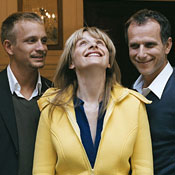- REVIEW
- READER REVIEWS
Summer Hours
|
|
Genre
Drama
Producer
Charles Gilibert
Distributor
IFC Films
Release Date
May 15, 2009
Release Notes
NY
Official Website
Review
Hats off to Olivier Assayas’s plain yet hauntingly beautiful Summer Hours, a true�albeit nonsecular�meditation on art and eternal life. The first half hour belongs to a time-honored genre, the country-house reunion drama. A 75-year-old widow, Hélène (Edith Scob), welcomes her three children and their families to the estate outside Paris she inherited from her loving (perhaps in both senses) uncle, a famous artist. We can tell she’s dying�death is in the air. The question hovers: What will happen to the house, the Corot paintings, the nineteenth- century glassware, the etched silver, the Viennese armoire? Frédéric (Charles Berling), the eldest sibling, assumes it will all remain in the family so his children and their children can swim, climb trees, and live among the works of art�simply displayed but pervasive in their aura. But businessman Jérémie (Jérémie Renier) plans to relocate to China with his wife and kids and needs money; and Adrienne (Juliette Binoche), a designer, has little use for France, dividing her time between Japan and New York, where she lives with her boyfriend. Despite Frédéric’s sorrow, there isn’t much to debate. Bring on the appraisers and auctioneers.
The obvious comparison is to Chekhov’s Cherry Orchard, with its harsh coming of a new social order and passing of one that’s lovely but essentially useless (or, at least, nonutilitarian). Underneath the mundane exchanges here, great forces are at work�globalization, the disintegration of a culture, and the triumph of economic forces over art. But masterpieces make their own rules, and Summer Hours is spare, glancing, tactile�sui generis. Assayas began his career making movies with gentle tempos but is coming off a slew of extroverted, erotic, sensationalistic dramas and thrillers in which his subjects seemed caught on the fly and his camera fetishized everyone. Those films�rewarding but motley�have freed him. His touch is alert but relaxed, his frames loose yet vivid. Despite the arty milieu, there isn’t a trace of artiness. (I was surprised to see Assayas invoke Wong Kar-Wai in an interview�the film is a world away from an aesthete’s play of light and color.) Summer Days is earthbound for the best of reasons. In the room where her uncledied, Hélène holds up his final sketch, of the window and curtains�holds it up against that window and curtains to show the contrast between life and life transformed and preserved.
I fear I’ve made Summer Hours sound heavy when it’s lighter than air�lighter than The Unbearable Lightness of Being. Berling suggests a man racked by the fear of floating away. (When his teenage daughter is caught with drugs, he knows his family is going, going, gone.) Binoche, the least actressy of great actresses, shows Adrienne’s restiveness by indirection�by never seeming rooted enough to make a scene. Edith Scob was immortalized in the most lyrical of horror films, Georges Franju’s Eyes Without a Face, the fragile beauty behind the mask whose skin grafts never took. That face, aged but still lovely, its bone structure intact, carries a whiff of the tomb�that inexplicable awareness of decay in the summeriest of hours.
